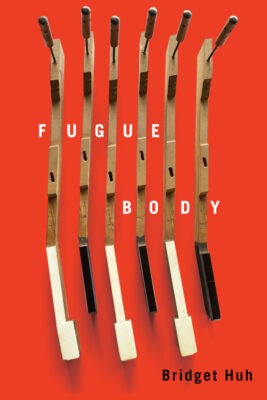The title poem of Bridget Huh’s Fugue Body recounts the claustrophobic experience of being racialized. The narrator, a child of Korean-speaking immigrants, describes feeling “enclosed” by the English language. They attempt to find their way through conversations with well-intentioned but annoying white people, “muddling” notes at the seat of a piano, with “arms / as tender and yielding as overcooked / spinach.” Over the course of the collection, different speakers try to use music to break free from their own confinements, for instance in the poems which take on the voice of a boozing nineteenth–century composer, who writes “until there were / no more voices inside.” Fugue Body Vehicule Press
Bridget Huh
$19.95
paper
80pp
9781550656763
The composer’s attempts to free himself from this fugue state are quashed, if not explicitly then at least formally, in elliptical passages that are sometimes cordoned off from the rest of the work entirely by square brackets. If speakers manage to break through at all, it might be when they forego elaborate composition in the first place. The collection descends, near the middle, to a lovely one-two sequence: there is the quirky, slightly neurotic poem “Sometimes I’m,” followed by the sweet and straightforward “Aria.” The former includes the most memorable four lines in the whole book: “When was the last time we ever / had a good laugh together? / The feeling of our bare asses / on the new blue couch.”
The latter, meanwhile, defies language categories entirely by inventing its own (“white sandflesh [blushing] brown”), and goes on to catalogue details about a particular love that recalls the poetry of Frank O’Hara. Like O’Hara, Huh’s speaker finds love in the beloved’s idiosyncrasies, the asymmetries of the face: “The sunlit / orchard and your insistence on biting into every kind / of apple, leaving a trail of them as you go. The sun / gazing right at you. You winking back, with both / eyes.”mRb






0 Comments